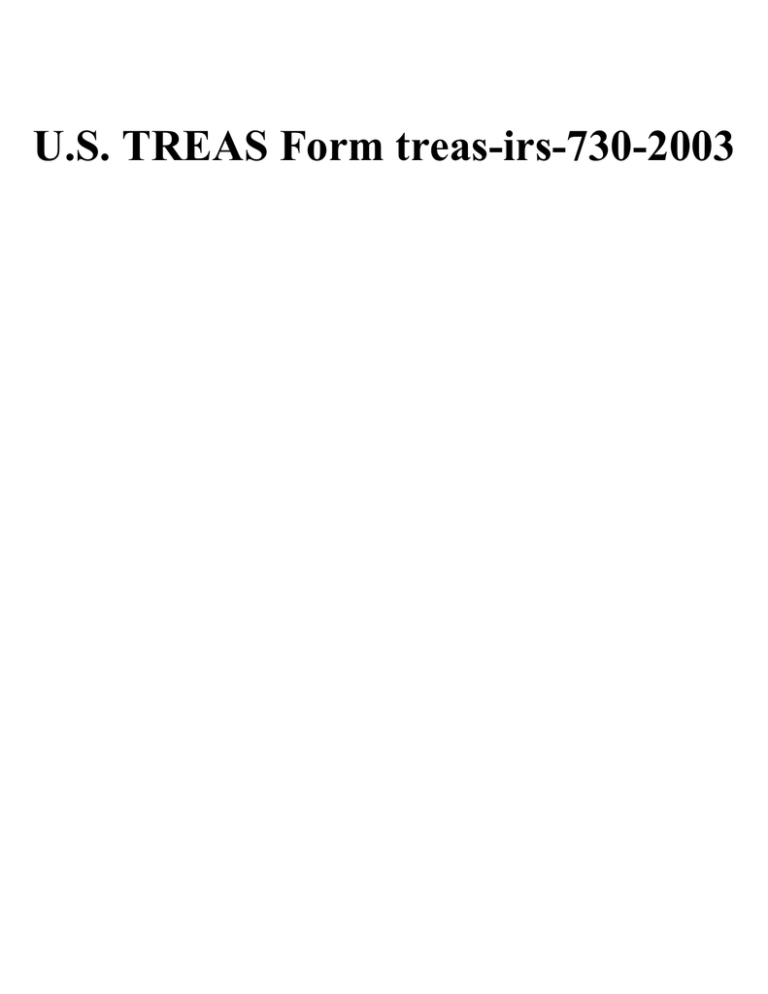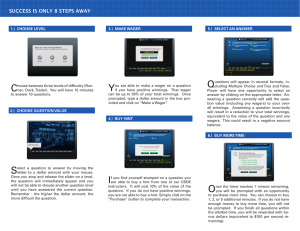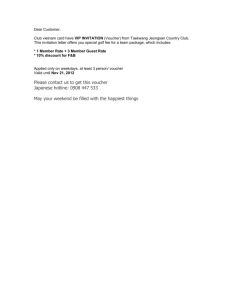U.S. TREAS Form treas-irs-730-2003
advertisement

U.S. TREAS Form treas-irs-730-2003 Form 730 Monthly Tax Return for Wagers OMB No. 1545-0235 (Section 4401 of the Internal Revenue Code) For IRS Use Only (Rev. October 2003) Department of the Treasury Internal Revenue Service Enter your name, address, employer identification number, and month and year of return. Name 䊳 T FF FD FP I T Month and year Number, street, and room or suite no. Employer identification number City, state, and ZIP code Check applicable boxes: Final return Address change 1 Gross amount of wagers accepted during month (not including laid-off wagers) (see instructions) 1 2 Gross amount of laid-off wagers accepted during month (see instructions) 2 3 Add lines 1 and 2 3 4a Tax on wagers authorized under the law of the state in which accepted. Enter the amount of these wagers included in line 3; multiply by the amount shown and enter the result $ b Tax on wagers other than wagers described on line 4a. Enter the amount of these wagers included in line 3; multiply by the amount shown and enter the result $ c Tax on wagers. Add lines 4a and 4b 5 × .0025 = 4a × 4b 4c .02 = 5 Credits. No credit is allowed unless supported by evidence. (see instructions) 6 Balance due. Subtract line 5 from line 4c. Complete Form 730-V, Payment Voucher. 6 File this return, your payment, and voucher with the IRS as shown under Where to file on page 2. Make your check or money order payable to the “United States Treasury”. Write your name, address, EIN, and “Form 730” on it. Sign Here Keep a copy of this return for your records. Under penalties of perjury, I declare that I have examined this return and any accompanying certificates and statements, and, to the best of my knowledge and belief, they are true, correct, and complete. 䊳 䊳 Signature Date (Type or print your name below signature.) Instructions Section references are to the Internal Revenue Code unless otherwise noted. What’s new? New Form 730-V, Payment Voucher, must be included with your return and payment if you have a balance due on line 6 of Form 730. If you usually receive Form 730 from the IRS, there should be three preaddressed Forms 730 and a voucher page with three preaddressed vouchers. If you order Form 730 from the IRS or download it from the IRS website, one voucher is included with Form 730. The scanning boxes have been eliminated to accommodate these changes. Who must file. You must file Form 730 and pay the tax on wagers under section 4401(a) if you: ● Are in the business of accepting wagers, ● Conduct a wagering pool or lottery, or ● Are required to be registered and you received wagers for or on behalf of another person but did not report that person’s name and address. Use Form 11-C, Occupational Tax and Registration Return for Wagering, to register. What is taxed. The tax applies only to wagers accepted in the United States or placed by a person who is in the United States with a person who is a U.S. citizen or resident. Taxable wagers include those placed: ● On a sports event or contest with a person engaged in the business of accepting wagers on a sports event or contest. ● In a wagering pool on a sports event or contest if the pool is conducted for profit. ● In a lottery conducted for profit, including the numbers game, policy, punch boards, and similar types of wagering. What is not taxed. The tax is not imposed on the following five items: ● Parimutuel wagering, including horse racing, dog racing, and jai alai, when it is licensed under state law. ● Coin-operated devices, such as pinball machines. For Privacy Act and Paperwork Reduction Act Notice, see page 2. ● Sweepstakes, wagering pools, or lotteries that are conducted by an agency of a state, if the wager is placed with the state agency or its authorized agents or employees. ● Games of the type in which all persons placing wagers in the game are present when wagers are placed, winners are determined, and prizes or other property are distributed. ● Drawings conducted by an organization exempt from tax under sections 501 and 521, as long as the net proceeds of the drawing do not benefit a private shareholder or individual. When to file. If you are liable for tax, file Form 730 for each month by the last day of the month following the month for which you are reporting taxable wagers. The IRS will not send you a notice that a return is due. Once you file a return reporting tax, file a return each month whether or not you have taxable wagers to report. If you have no tax to report, write “None” in the entry space for line 6; sign and date Form 730. If you stop accepting wagers, check the final return box above line 1. Cat. No. 20585U Form 730 (Rev. 10-2003) Page Form 730 (10-2003) Where to file. Mail your return to the Internal Revenue Service, Cincinnati, OH 45999-0100. Recordkeeping. Keep copies of your tax returns, records, and accounts of all transactions to show that the correct tax has been paid. Keep records to support all adjustments claimed and all exemptions at least 4 years from the latest of the following dates: when the tax became due, when you paid the tax, when you claimed an adjustment, or when you filed a claim for refund. Always keep your records available for IRS inspection. Penalties. Avoid penalties and interest by filing returns and paying taxes when due. The law provides penalties for filing a return late; paying taxes late; failing to file a return; negligence; and fraud. These penalties are in addition to the interest charge on late payments. The penalty for filing a return late will not be imposed if you can show that the failure to file a timely return is due to reasonable cause. Unresolved tax problems. The Taxpayer Advocate’s office may assign a personal advocate to taxpayers who have been unable to resolve their problems with the IRS. You can write to the Taxpayer Advocate at the IRS office that last contacted you or call a toll-free assistance number, 1-877-777-4778. Persons who have access to TTY/TDD equipment may call 1-800-829-4059 to ask for help from the Taxpayer Advocate. This office cannot change the law or technical decisions, but it can help clear up problems that resulted from previous contacts. Disclosure of information on wagering taxes. Except for administering or enforcing Internal Revenue taxes, neither the Treasury Department nor any of its employees may disclose documents, records, or information obtained through them that a taxpayer supplies in connection with wagering taxes. Also, certain documents related to wagering taxes and information obtained through them that relates to wagering taxes may not be used against the taxpayer in any nontax criminal proceeding. See section 4424 for more details. Completing Form 730. If you are not using the preaddressed Form 730, enter your name, address, employer identification number (EIN), and the month (MM) and year (YYYY) for which this form is filed. Rounding. You may round amounts to whole dollars. If you do round, leave the boxes for the cents amounts blank. You can drop amounts that are less than 50 cents, and increase amounts that are 50 cents or more to the next whole dollar. If you do round, do so for all amounts. But if you have to add two or more amounts to figure the amount to enter on a line, include cents when adding and only round off the total. Line 1. Enter the gross amount of wagers accepted during the month. Gross wagers are the total of those wagers that are authorized and those wagers that are not authorized by the state in which they are accepted. Include all charges connected with placing the wager. If you can prove that the person placing the wager has paid a separate charge equal to the tax, do not include that amount in the amount of the wager. Do not include laid-off wagers in this amount. Line 2. Enter the gross amount of any laid-off wagers accepted during the month. Gross laid-off wagers are the total of those laid-off wagers that are authorized and those that are not authorized by the state in which they are accepted. Lines 4a and 4b. Enter the applicable amount included in line 3. Multiply the amount by the rate shown and enter the result. The rate of tax depends on whether the wager is authorized by the laws of the state in which the wager was accepted. The lower rate applies to wagers that are authorized by state law. Line 5. You may be able to claim a credit for the amount of any overpayment of tax or for the amount of tax imposed with respect to a wager that you laid off. Credit for an overpayment of tax. Generally, you may claim a credit for any overpayment of tax. The claim must be filed within 3 years from the time the Form 730 reporting the tax was filed or 2 years from the time the tax was paid, whichever is later. No credit is allowed unless a statement of the facts involving the overpayment is attached that includes the following information: ● An explanation of the reason for claiming a credit. ● The date of payment and the amount of the tax. ● Whether any previous claim covering the amount involved, or any part, has been filed. ● A statement that you: 1. Have not collected (whether as a separate charge or otherwise) the amount of the tax from the person that placed the wager on which the tax was imposed, or 2. Have repaid the amount of the tax to the person that placed the wager, or 3. Have the written consent of the person that placed the wager to the allowance of the credit. The consent must be attached to the return. ● If the overpayment relates to a laid-off wager accepted by you, one of the above three statements must be attached for both the person who placed the laid-off wager with you and the person who placed the original wager. Credit for wagers laid off by you. If you accept a wager and lay off all or a part of that wager with a person who is liable for tax then follow the rules below to claim a credit depending if you paid the tax. ● If you have not paid the tax, a credit may be claimed on Form 730 in the amount of the tax due for the laid off wager, provided there is attached to Form 730 for the month during which the wager was accepted and laid off the certificate described in Regulations section 44.6419-2(d). 2 ● If you have paid the tax, a credit may be allowed for the tax paid on the laid-off amount. The claim must be filed within 3 years from the time the return reporting the tax was filed or 2 years from the time the tax was paid, whichever is later. Interest will not be allowed on a credit for the tax imposed on a wager that you laid off. No credit is allowed unless the following information is attached to the return for each laid-off wager: 1. The certificate described in Regulations section 44.6419-2(d). 2. A statement that includes: a. The reason for the credit, b. The month in which the tax was paid, c. The date of payment, and d. Whether any previous claim covering all or part of the amount involved has been filed. Line 6. New Form 730-V, Payment Voucher, must be filed with Form 730 if you have a balance due on line 6. Privacy Act and Paperwork Reduction Act Notice. We ask for the information on Form 730 to carry out the Internal Revenue laws of the United States. You are required to give us the information. We need it to ensure that you are complying with these laws and to allow us to figure and collect the right amount of tax. Section 4401 of the Internal Revenue Code imposes a tax on wagering. Form 730 is used to determine the amount of the tax. Section 6109 requires you to provide your employer identification number (EIN). Routine uses of this information include giving it to the Department of Justice for civil and criminal litigation, and to cities, states, and the District of Columbia for use in administering their tax laws. If you fail to provide this information in a timely manner or provide false information, you may be liable for penalties and interest. You are not required to provide the information requested on a form that is subject to the Paperwork Reduction Act unless the form displays a valid OMB control number. Books or records relating to a form or its instructions must be retained as long as their contents may become material in the administration of any Internal Revenue law. Generally, tax returns and return information are confidential, as required by section 6103. The time needed to complete and file Form 730 will vary depending on individual circumstances. The estimated average times are: Recordkeeping, 6 hr., 4 min.; Learning about the law or the form, 47 min.; Preparing, copying, assembling, and sending the form to the IRS, 56 min. If you have comments concerning the accuracy of these time estimates or suggestions for making this form simpler, we would be happy to hear from you. You can write to the Tax Products Coordinating Committee, Western Area Distribution Center, Rancho Cordova, CA 95743-0001. Do not send Form 730 to this address. Instead, see Where to file above. Form 730 Payment Voucher Purpose of Form Complete Form 730-V if you are making a payment with Form 730, Monthly Tax Return for Wagers. We will use the completed voucher to credit your payment more promptly and accurately, and to improve our service to you. If you have your return prepared by a third party and a payment is required, provide this payment voucher to the return preparer. Specific Instructions Box 1—Employer identification number (EIN). If you do not have an EIN, apply for one on Form SS-4, Application for Employer Identification Number, and write “Applied For” and the date you applied in this entry space. Form 䊲 Box 2—Amount paid. Enter the amount paid with Form 730. Box 3. Enter the same date you entered on page 1 of Form 730. Box 4—Name and address. Enter your name and address as shown on Form 730. ● Enclose your check or money order made payable to the “United States Treasury.” Be sure to enter your EIN “Form 730,” and the tax period on your check or money order. Do not send cash. Do not staple this voucher or your payment to Form 730 (or to each other). ● Detach the completed voucher and send it with your payment and Form 730. See Where to file on page 2 of Form 730. Detach Here and Mail With Your Payment and Form 730. 730-V 䊳 Do not staple or attach this voucher to your payment. 1 Enter your employer identification number. 2 Y Y Dollars Enter the amount of your payment. M M Enter your address. Send Form 730, this voucher, and payment to: Internal Revenue Service Cincinnati, OH 45999-0100 䊳 4 Enter your business name (individual name if sole proprietor). Enter year and month as shown on Form 730. Y (2003) OMB No. 1545-0235 Department of the Treasury Internal Revenue Service Y 730-V Payment Voucher (October 2003) 3 Form 䊲 Enter your city, state, and ZIP code. Cents






